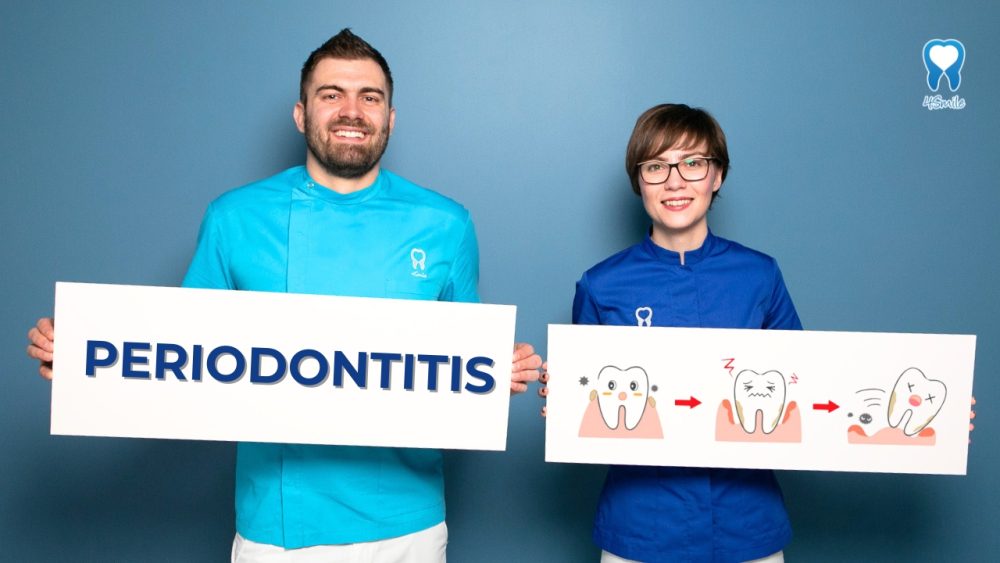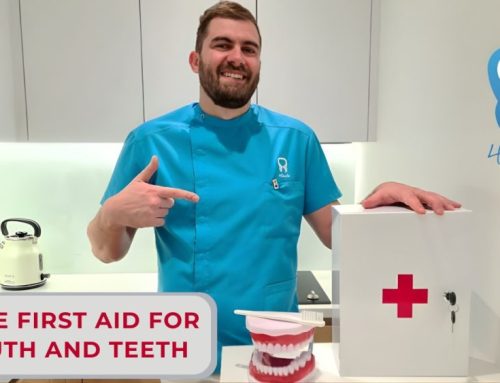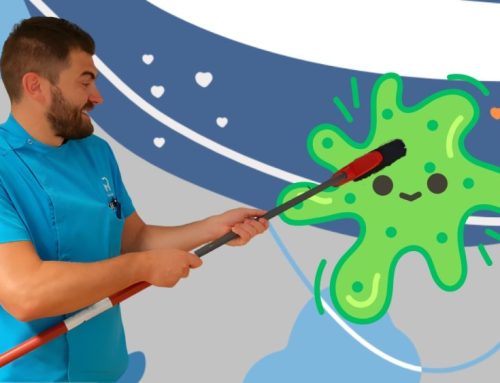Periodontitis is a silent disease in its early stages, and painful in the later stages. It occurs as a result of untreated gingivitis – an inflammation of the gums.
In some cases, a predisposition to periodontitis may be genetic, but the general cause of this gum disease is neglecting oral hygiene.
Research has shown that periodontitis affects up to 40% of the population and is the leading cause of cavities and tooth loss in adults.
In addition to being a gum disease, it’s important to note that periodontitis increases the risk of vascular diseases, heart attack, blood clotting, and stroke by up to 20%.
For all these reasons, it’s crucial to prevent periodontitis and halt its further development!
By treating gum inflammation, periodontitis can be prevented. However, if it progresses to a more advanced stage, it’s not too late to keep periodontitis under control. In this week’s blog, Dental Center 4Smile provides tips for the prevention and treatment of periodontitis.
PREVENTION OF PERIODONTITIS
When it comes to a disease like periodontitis, which cannot be completely cured but can only be controlled, prevention is the best method.
To prevent periodontitis, Dr. Ivan Antolković recommends the following:
- Regular check-ups with your dentist, Dr. Ivan Antolković, every 6 months along with teeth cleaning
Note: Pay attention to the importance of more frequent check-ups with your dentist, especially if your parents have gum disease, as gum disease is genetically transmissible! - Mandatory treatment of gingivitis – Early treatment of gum inflammation prevents the further penetration of bacterial deposits that ultimately lead to periodontitis and cause permanent damage to your oral health, functionality, and smile aesthetics.
- Treatment of diabetes – People with diabetes have an increased risk of developing periodontitis because diabetes causes thickening of the blood vessels. This slows down the flow of nutrients and the removal of waste from body tissues, including the oral cavity, leading to a reduced immune response.
Since periodontitis is a bacterial infection, diabetics are more susceptible to frequent and severe gum inflammations.
Note: Diabetics also face slower tissue healing, so it’s especially important to prevent periodontitis before it reaches an advanced stage where surgery might be required. - Timely response to symptoms of gum disease: – Bleeding gums during brushing
– Redness and swelling of the gums
– Persistent bad breath and unpleasant taste in the mouth
– Changes in bite and the sensation of teeth shifting
– Prolonged appearance of teeth due to gum recession
– Appearance of empty spaces between teeth and gums - Maintaining good and regular oral hygiene:
– Brushing teeth 2 times a day for 2 minutes
– Using a waterpik or dental floss
– Using a soft-bristled toothbrush and toothpaste designed for sensitive gums that contains fluoride - Avoiding bad habits:
– Avoiding or quitting smoking
– Limiting alcohol consumption
– Limiting consumption of sugary foods - Healthier diet – A diet rich in whole foods and fresh fruits and vegetables
- Drinking enough water – Dehydration can lead to dry mouth, which favors bacterial growth, while adequate saliva helps naturally remove food debris.
TREATING PERIODONTITIS
Periodontitis progresses through four stages:
- Stage 1 – Gingivitis
- Stage 2 – Early Periodontitis
- Stage 3 – Moderate Periodontitis
- Stage 4 – Advanced Periodontitis
If periodontitis is detected early, treatment is far less painful and much easier compared to the later stages. The more advanced the stage of periodontitis, the more complicated it becomes to prevent irreversible tooth loss.
If periodontitis has advanced, the following may be necessary:
- Follow the instructions provided by Dr. Ivan Antolković
- Frequent professional teeth cleaning every 2-3 months
– After each professional teeth cleaning, use Parodontax Extra 0.2% mouthwash for 7 days, which controls plaque, stops bleeding, and reduces gum irritation (not for daily use).
- Surgical procedures to reduce periodontal pockets (in some cases of advanced disease)
- Prescribed antibiotics to eliminate bacterial deposits and prevent further tissue and bone loss
- Maintain good and regular oral hygiene:
– Brush your teeth 2 times a day for 2 minutes
– Use an oral irrigator or dental floss
– Use a soft-bristled toothbrush with toothpaste designed for sensitive gums containing fluoride
– Use antibacterial products, such as those containing sage, which has antimicrobial properties and speeds up wound healing while preventing gum bleeding.
- Avoiding bad habits:
– Avoid smoking
– Limit alcohol consumption
– Limit sugary foods
HOW TO BEAT PERIODONTITIS?
Since periodontitis takes time to reach a critical stage, timely response and prevention are key to overcoming this disease.
Good oral hygiene habits are the most important for preventing plaque and tartar buildup, which are the main causes of periodontitis.
Following the recommendations of your dentist, Dr. Ivan Antolković, for treating gum disease is the key to successful therapy that halts the further development of periodontitis.
If you notice any symptoms indicating gum problems, schedule an appointment at Dental Center 4Smile immediately. The first check-up is free, and Dr. Ivan Antolković will help you prevent periodontitis or stop its further progression.
Even if you didn’t react in time, it’s crucial to take action as soon as possible. If you have already lost teeth, Dental Center 4Smile offers solutions to replace lost teeth, prevent further bone loss, and stop the movement of remaining teeth.
Let’s work together to beat periodontitis – Let’s work together toward a smile!















